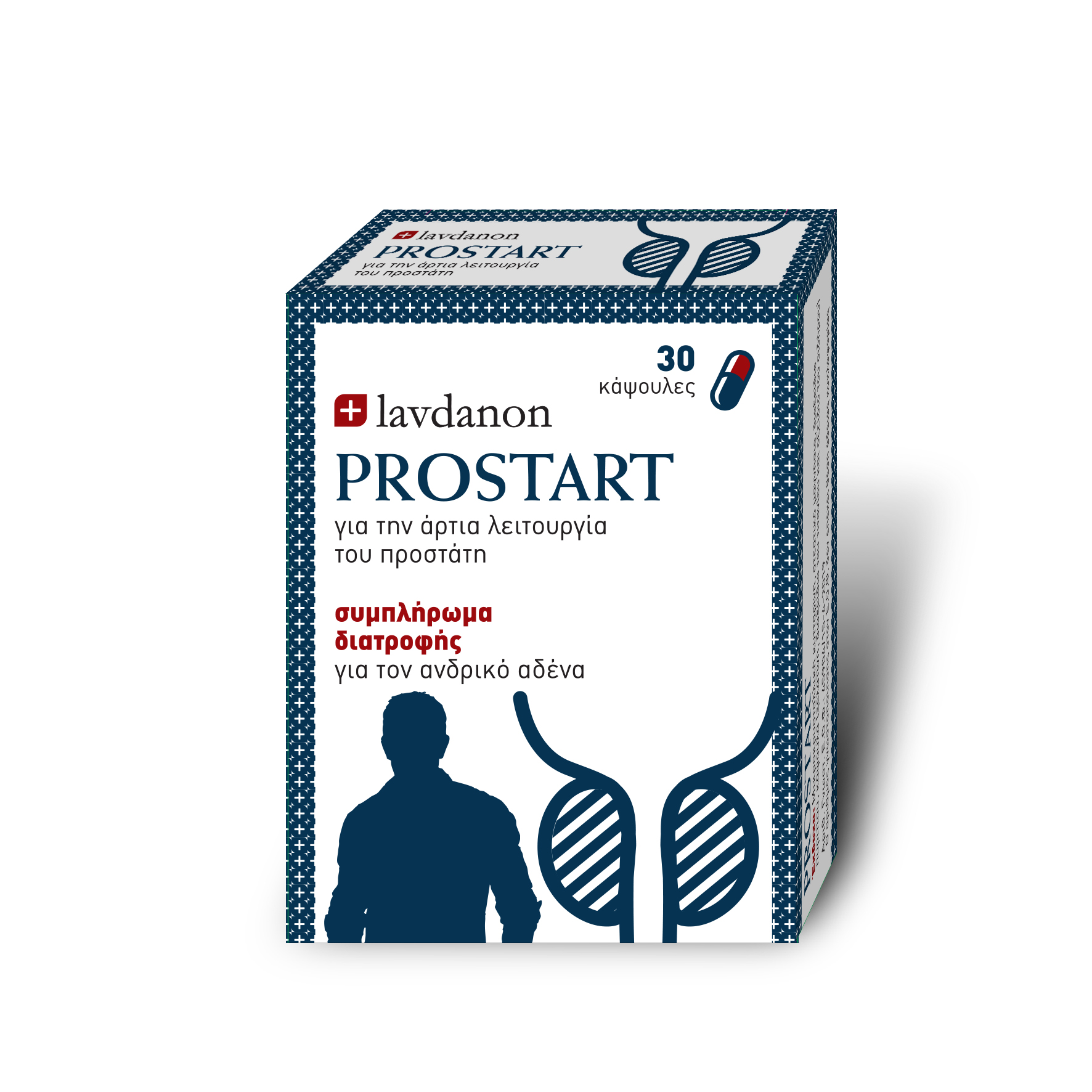PROSTART CAPS
Helps the normal functioning of the prostate gland.
Reduces the need for frequent night urination.
It
contributes to normal spermatogenesis and sexual function in men.
Ingredients (in 2 capsules daily dose):
- Saw Palmetto extract (Serenoa repens) ...... 320mg
- Nettle extract (Urtica dioica) ................... 240mg
- Willowherb extract (Epilobium parviflorum) ....240mg
- Selenium (Selenium) ..............................
............ 100μg
Prostate hypertrophy
Prostate is a gland located between the bladder and the penis that produces part of the sperm components. As the age grows, it increases, hypertrophies, hinders urination, causes pain and is a risk factor for malignancy.
Diseases of the prostate are mainly caused by its enlargement and are relatively common. 40% of men between 50-60 years of age and 90% between 80-90 years may have any symptoms of enlarged prostate. The reason for this is that in men after 40 years, levels of the hormone prolactin are increasing, thus stimulating the production of certain enzymes (5-alpha). This in turn increases the conversion of testosterone into dihydrotestosterone, leading to prostate growth and concomitant problems.
Symptoms of prostate hypertrophy are:
- having trouble urinating
- weak urine stream
- poor bladder control;
- the need for frequent, more than once, night-time urination;
- sudden pain in the lower abdomen.
Both synthetic drugs (finasteride, terazosin) and phytotherapeutic natural remedies are used to treat these diseases.
The world's most popular and proven natural remedy is the fruit extract of the palm tree.
In Italy, the use of phyto products (mostly based on salmon palm extract) in prostate diseases is 6 times greater than in synthetic ones. In Germany, nearly 90% of patients and doctors prefer natural phyto products.
Saw Palmetto (Serenoa repens) and Nettle (Urtica
dioica)
Many of the prostate remedies are entirely chemically based and have various side effects. They
lead not only to general malaise and discomfort, but also to an unnecessary burden on the kidneys and the
liver.
Phytosterols
In recent decades, US and European scientists have placed a special focus on
the prevention and treatment of many diseases through the use of so-called phytosterols.
Phytosterols are absolutely natural substances that are contained in the fleshy parts of some plants. They are the kind of organic chemicals that plants synthesize during their life cycle. Clinical studies clearly demonstrate the positive effect of extracts of some plants on enlargement and inflammation of the prostate.
The first place in the fight against prostate disease holds the palm tree (saw palmetto). It grows mainly in
the south-eastern part of North America. Often, there is an aphrodisiac reputation.
It has been shown to
play a role in reducing the size of the prostate and to help it function effectively.
Phytosterols extracted from the palate sato block the enzyme that is responsible for the conversion of free testosterone to toxic dihydrotestosterone. This blocking leads to:
- counteracting inflammatory processes, muscle spasms and prostate enlargement;
- relieving the symptoms of difficulty in urinating, frequent need for urination, nausea (often urinating at night), residual urination (incomplete bladder emptying).
Surveys
In 2003, a study published in the American Family Physician published 21 research papers involving more than 3,000 men aged 65 and over. The results of the doctors are absolutely clear that the plant palm extract is a useful, indispensable and necessary remedy for the health of the prostate.
Scientific research has shown that the use of products containing salmon palm extract is a safe and effective alternative to standard drug therapy while not having side effects.
Phytosterols extracted from the palm and nettle sago block the enzyme that is responsible for converting free testosterone to toxic dihydrotestosterone. This blocking leads to:
- counteracting inflammatory processes, muscle spasms and enlargement of the prostate
- relieving the symptoms of difficulty urinating, frequent urination, nausea (often urinating at night), residual urination (incomplete bladder emptying)
Willowherb (Epilobium parviflorum)
- a beneficial effect of the prostate gland and bladder
- contributes to a better functioning of the genitourinary system
- reduces the need for frequent nighttime urination
Selenium (Selenium)
- contributes to normal spermatogenesis
- has a beneficial effect on male potency



